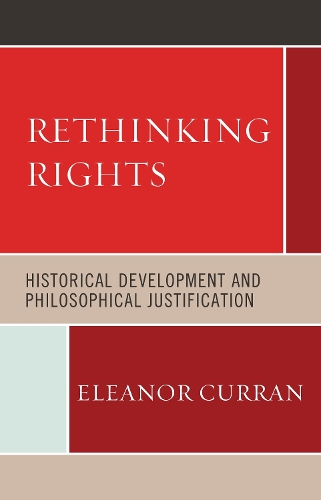
Rethinking Rights: Historical Development and Philosophical Justification
(Hardback)
Publishing Details
Rethinking Rights: Historical Development and Philosophical Justification
By (Author) Eleanor Curran
Bloomsbury Publishing PLC
Lexington Books
4th April 2022
United States
Classifications
Professional and Scholarly
Non Fiction
History of ideas
Jurisprudence and general issues
Human rights, civil rights
323
Physical Properties
Hardback
180
Width 160mm, Height 228mm, Spine 20mm
445g
Description
Re-thinking Rights: Historical Development and Philosophical Justification takes a new look at the history of individual rights, focussing on the way that philosophers have written that history. The scholastics and early modern writers used the notion of natural rights to debate the big moral and political questions of the day, such as the treatment of Indigenous Americans under Spanish rule. John Locke put natural rights at the centre of liberal political thought. But as the idea grew in strength and influence, empiricist and positivist philosophers punctured it with attacks on logical incompetence and illegitimate appeals to theology and metaphysics. Philosophers then turned to law and jurisprudence for the philosophical analysis of rights, where it has largely stayed ever since. Eleanor Curran argues that the dominance of the Hohfeldian analysis of (legal) rights has restricted our understanding of moral and political rights and led to distorted readings of historical writers on rights. It has also led to the separation of right from the important related notion of libertyfreedoms are now seen as inferior to claims. Curran looks at recent philosophy of human rights and suggests a way forward for justifying universal moral and political rights and separating them from legal rights.
Reviews
Eleanor Curran is one of the premier theorists of the history of philosophy of individual rights, beginning with rights in the seminal thought of Thomas Hobbes. In her new book, which elucidates conceptions of natural rights from scholastic and early modern conceptions through empiricist and positivist attacks on those, Curran persuasively argues that we should reject the dominant Hohfeldian conception of rights as legal claims in favor of a novel way of justifying universal moral and political rights that separates them from most legal rights. Her argument that doing so provides a superior path for justifying universal moral and political rights is one that no serious theorist of rights can afford to ignore.
-- Sharon Anne Lloyd, University of Southern CaliforniaAuthor Bio
Eleanor Curran is honorary senior lecturer in the Philosophy Department and Law School at the University of Kent.
